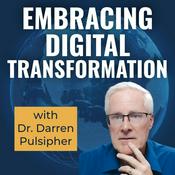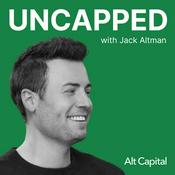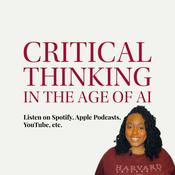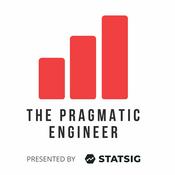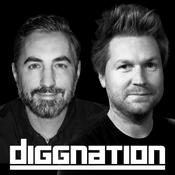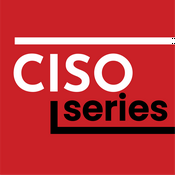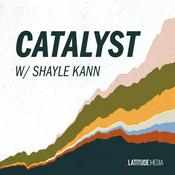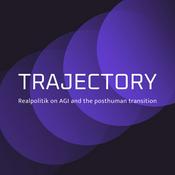32 episodes
Programming Sunlight: How Reflect Orbital Is Building Satellites to Redirect Light From Space (Ben Nowack, Founder & CEO)
1/20/2026 | 1h 18 mins.Most energy conversations start with scarcity. This one starts with abundance. Sunlight powers nearly everything on Earth, directly or indirectly. And yet we have almost no control over when or where we get it. Ben Nowack thinks that’s a solvable problem. Ben is the founder and CEO of Reflect Orbital, a company building satellites designed to redirect sunlight from space—not as a thought experiment, but as a product. The company nearly died before it worked. Eight months in, Ben had $300 left and was living in a garage. He made a deliberate decision to go $50,000 into credit card debt to finish critical tests. At one point, he was down to $21 of available credit. A month later, Reflect raised its first round. Today, the company is preparing to launch its first revenue-generating satellites. This is a conversation about building conviction, finding the real market, and what changes when a fundamental resource becomes programmable.
In our conversation, we explore:
How Reflect’s satellites work
The surprising pivot from energy to lighting applications that made the business immediately viable
Ben’s remarkable journey from building RC planes and X-ray machines in high school to founding Reflect
Why previous attempts at space mirrors failed and what’s changed to make this possible now
The near-death moment when Ben went $50,000 into credit card debt to keep his vision alive
How Reflect plans to scale from moonlight-level brightness to potentially powering solar farms
The company’s first satellite launches planned for this year, and their path to a full constellation
The wide range of applications, from emergency response to municipal lighting to agriculture
—
Timestamps
(00:00) Introduction to Ben Nowack
(02:26) What Reflect Orbital is building
(05:07) How the satellite constellation works
(08:00) What Reflect is launching this year
(10:35) Finding early markets
(13:43) Ben’s childhood and early building experiences
(22:04) What Ben learned working for startups
(28:03) High school projects: X-ray machines, rocket engines, and fusion reactors
(33:14) The eureka moment that led to Reflect
(35:24) Early validation of the idea
(38:35) The Russian space mirror experiments of the 1990s and what’s changed
(42:31) Partnering with Tristan Similac as co-founder
(45:05) Baiju Bhatt’s involvement
(47:04) Why Reflect isn’t pivoting to space-based data centers
(50:54) Common misconceptions about Reflect’s technology
(55:11) Why programmable light is valuable
(1:01:28) Initial target markets
(1:03:42) The future markets for Reflect
(1:07:33) Reflect’s company culture and operational philosophy
(1:12:05) Surprises and struggles in building Reflect
(1:14:56) Putting the idea to the test
—
Follow Ben Nowack
LinkedIn: https://www.linkedin.com/in/ben-nowack
X: https://x.com/bennbuilds
—
Resources and episode mentions
—People—
Vladimir Syromyatnikov: https://en.wikipedia.org/wiki/Vladimir_Syromyatnikov
Tristan Semmelhack on LinkedIn: https://www.linkedin.com/in/tristan-semmelhack-6a1ba0149
Baiju Bhatt on LinkedIn: https://www.linkedin.com/in/bprafulkumar
Marc Andreessen on X: https://x.com/pmarca
J.P. Morgan: https://en.wikipedia.org/wiki/J._P._Morgan
Ric Burton on LinkedIn: https://www.linkedin.com/in/richardjburton
—Other resources—
Reflect Orbital: https://www.reflectorbital.com
Zipline: https://www.zipline.com
Cassegrain: https://en.wikipedia.org/wiki/Cassegrain_reflector
Advanced Composite Solar Sail System (ACS3): https://www.nasa.gov/mission/acs3
Znamya: https://en.wikipedia.org/wiki/Znamya_(satellite)
Aetherflux: https://www.aetherflux.com
Elon Musk’s post on X about building a sentient sun: https://x.com/elonmusk/status/1985048731818094950
Denali: https://en.wikipedia.org/wiki/Denali
—
Production and marketing by penname.co. For inquiries about sponsoring the podcast, email [email protected].Nothing’s Carl Pei on Building a $1B Smartphone Company, Why He Left OnePlus After 10 Days of Retirement, and Why He Thinks About Death Every Week
1/13/2026 | 1h 19 mins.Carl Pei is the founder of Nothing, the consumer electronics company known for its distinctive transparent design language across smartphones and audio products. Before launching Nothing in 2020, Carl co-founded OnePlus, where he spent seven years helping build it into a major smartphone brand. But Carl’s instincts as a builder showed up much earlier. As a teenager, he taught himself to code by building Pokémon fan sites, all while moving between China, the U.S., and Sweden. That combination of early creation and constant change shaped a founder comfortable with uncertainty—and deeply motivated by questions bigger than products. Carl thinks often about time and mortality, is skeptical of early retirement, and believes creativity is humanity’s real advantage. In an industry obsessed with optimization, he’s focused on making technology feel meaningful again.
In our conversation, we explore:
The origins of Nothing’s transparent design language and how it helps differentiate the brand in a mature, competitive market
Carl’s childhood fascination with mortality and how it continues to drive his ambition today
Nothing’s multiple near-death experiences, from 80% defect rates on first products to fundraising struggles
Why India has become a crucial market for Nothing’s smartphone business
How Nothing approaches community involvement, including letting users invest alongside VCs
The company’s approach to integrating AI features without overhyping the technology
Carl’s admiration for Genghis Khan’s management style and talent acquisition approach
The future of consumer electronics beyond smartphones
—
Thank you to our sponsor, Guru — The AI source of truth for work
—
Transcript: https://www.generalist.com/p/nothings-carl-pei-on-building-a-1b-smartphone-company
—
Timestamps
00:00) Introduction to Carl Pei and Nothing
(02:44) Nothing’s long-term vision
(06:33) How existential thinking shapes Carl’s motivation
(10:12) Why Carl’s planned sabbatical ended after ten days
(12:35) Carl’s international upbringing
(16:02) Entrepreneurial experiments in China
(19:10) Carl’s competitive nature and attitude toward school
(25:30) Lessons from seven years at OnePlus
(28:07) Taking a break at age 31
(30:50) Carl’s fundraising strategy
(33:26) Why Carl chose London for Nothing’s HQ
(35:12) Lessons from Genghis Khan
(38:38) Nothing’s first near-death moment
(42:56) Nothing’s product evolution and breakout hits
(45:24) Partnering with Teenage Engineering
(49:28) Design inspirations
(51:36) How Nothing recruits talent
(53:42) Nothing’s approach to marketing
(56:51) How India became a key market
(59:48) Why Nothing created CMF
(1:02:12) Why Carl is bullish on India
(1:03:32) How Carl thinks about AI
(1:07:05) Rethinking ads based on community feedback
(1:09:05) How Nothing leverages community
(1:11:23) Why AI hardware is struggling
(1:13:37) Carl’s thoughts on the future of consumer electronics
(1:15:10) Philosophies that shape Carl’s worldview
(1:16:45) Final meditations
—
Follow Carl Pei
LinkedIn: https://www.linkedin.com/in/getpeid
X: https://x.com/getpeid
—
Resources and episode mentions: https://www.generalist.com/p/nothings-carl-pei-on-building-a-1b-smartphone-company
—
Production and marketing by penname.co. For inquiries about sponsoring the podcast, email [email protected].Why Being a Generalist VC Is a Competitive Advantage (Aydin Senkut, Founder & Managing Partner at Felicis Ventures)
12/09/2025 | 1h 16 mins.Two decades ago, Aydin Senkut was a first-time fund manager with a thin track record to show prospective backers. LPs didn’t believe a solo GP, especially one without experience at a legacy firm, could build a lasting franchise. They were wrong. Today, Felicis is a Silicon Valley mainstay on its 10th fund, a $900M vehicle. Across its history, Felicis has backed a slew of winners, including Shopify, Canva, Crusoe, and dozens of other billion-dollar outcomes. Rather than specialize over time, Aydin has remained a true generalist, investing across markets and cycles. In this conversation, we dig into the frameworks, stories, and philosophies that shaped Felicis into what it is — and where Aydin believes the next decade of technology is heading.
We explore:
How growing up in Turkey with entrepreneur parents shaped Aydin’s approach to risk and investing
Lessons from working alongside Larry Page and Sergey Brin during Google’s early days
Why Felicis deliberately chose a generalist strategy when most VCs were specializing
How international experience became a competitive advantage in finding global winners
The mathematical case for portfolio diversification (50-70 companies per fund)
Why valuation concerns are often overblown when revenue growth is exponential
Felicis’s aggressive AI investment strategy and what other investors are missing
The future of robotics and physical AI through companies like Skild AI
Why learning and adapting rapidly is Felicis’s constitutional principle
—
Thank you to our sponsor, Guru: The AI source of truth for work.
—
Transcript: https://www.generalist.com/p/why-being-a-generalist-vc-is-a-competitive-advantage
—
Timestamps
(00:00) Introduction
(03:09) How Aydin made his way to Silicon Valley
(06:15) What he learned from his entrepreneurial parents
(08:55) Learnings from the early days at Google
(15:05) The childhood roots of his investing philosophy
(16:31) Why rejection became a catalyst for his venture career
(19:28) Strategy behind Felicis's first $41M fund
(25:44) How his international background became an investing edge
(28:17) How Aydin approaches diversification at scale
(32:08) How he sizes investments based on conviction
(33:15) Generalist vs. specialist investing
(38:23) Why founders are the foundation
(42:48) Why success may look different than expected
(43:46) The Felicis journey
(48:18) Why Felicis is going all in on AI
(54:54) Why entry point matters less than potential
(57:33) How the AI bubble debate misses the point
(59:47) What makes Skild AI a standout company
(01:04:58) The AI bets Felicis missed
(01:07:55) How missing Airbnb and Uber led to backing Adyen
(01:11:20) Final meditations
—
Follow Aydin Senkut
LinkedIn: https://www.linkedin.com/in/aydins
X: https://x.com/asenkut
—
Resources and episode mentions
—Books—
Antifragile: Things That Gain from Disorder: https://www.amazon.com/Antifragile-Things-That-Disorder-Incerto-ebook/dp/B0083DJWGO
Clear Thinking: Turning Ordinary Moments into Extraordinary Results: https://www.amazon.com/Clear-Thinking-Turning-Ordinary-Extraordinary/dp/0593086112
—People—
Larry Page: https://en.wikipedia.org/wiki/Larry_Page
Sergey Brin: https://en.wikipedia.org/wiki/Sergey_Brin
Eric Schmidt: https://en.wikipedia.org/wiki/Eric_Schmidt
Brian Chesky on X: https://x.com/bchesky
Shane Parrish’s blog: https://fs.blog
—Other resources—
Felicis: https://www.felicis.com
Mastering Portfolio Construction: https://www.generalist.com/p/mastering-portfolio-construction
Steve Jobs’s quote on focus: https://www.goodreads.com/quotes/629613-people-think-focus-means-saying-yes-to-the-thing-you-ve
Angry Birds: https://www.angrybirds.com
Rovio: https://www.rovio.com
Adyen: https://www.adyen.com
Canva: https://www.canva.com
...Resources continued at: https://www.generalist.com/p/why-being-a-generalist-vc-is-a-competitive-advantage
—
Production and marketing by penname.co. For inquiries about sponsoring the podcast, email [email protected].Joey Krug on Prediction Markets, Crypto Treasuries & the Next Era of On-Chain Finance (Partner at Founders Fund)
12/02/2025 | 1h 15 mins.Prediction markets are no longer a fringe curiosity. They are becoming one of the most revealing instruments in modern finance. Platforms like Polymarket, once a niche corner of crypto, now regularly clear billions in monthly volume as traders speculate on everything from political outcomes to sports to cultural events. Few people saw this future as early, or as clearly, as Joey Krug.
A decade before prediction markets went mainstream, Joey dropped out of college to co-found Augur, the first decentralized prediction market protocol. He later became one of the most influential investors in the category by backing Polymarket at Founders Fund. In this conversation, Joey shares why the moment for prediction markets has finally arrived, what has changed, and how these markets are reshaping information flows across society.
We explore:
The experimental mindset that led Joey from horse-racing predictions to mining bitcoin in high school
Why Augur was the right idea at the wrong moment, and what it taught Joey about timing and infrastructure
The product, liquidity, and founder-market fit signals that persuaded Founders Fund to back Polymarket
Why resolution is the hardest problem in prediction markets, and how Polymarket approaches it
How crypto treasury companies are emerging as a major force and where ETFs fit in
Why mimetic behavior drives entire sectors and how savvy investors read those waves
The rise and fall of Operation Choke Point and its impact on crypto
How Founders Fund reframed Joey’s approach to evaluating founders, markets, and structural shifts
—
Thank you to the partners who make this possible
Guru: The AI source of truth for work.
Auth0: Secure access for everyone. But not just anyone.
—
Transcript: https://www.generalist.com/p/joey-krug-on-prediction-markets
—
Timestamps
(00:00) Intro
(04:10) How Joey began making predictions with horse racing
(08:00) Why Joey began coding with Applesoft BASIC
(09:32) How Joey first discovered crypto
(11:06) Why Joey dropped out of school to pursue crypto
(12:52) The origins of Joey’s interest in medical school
(16:15) How Joey spends nights and weekends splitting time between biotech and trading
(17:18) The early influences behind Augur’s creation
(19:40) Why prediction markets captivated early crypto thinkers
(23:26) The unlock crypto created for prediction markets
(29:22) How Polymarket began and why Joey decided to back it
(32:11) What made Polymarket the right team
(35:25) The FBI raid and how Shane responded
(38:20) Why Joey expected Polymarket’s volume to hold after the election
(40:20) The trend toward duopolies in financial markets
(42:37) What sets Polymarket’s product design apart
(45:25) How to keep prediction markets clear and unambiguous
(48:31) The rise of crypto treasury companies and FF’s work with BitMine
(51:26) The value of crypto treasuries and the role of ETFs
(54:33) The mimetic rise of crypto treasury companies
(57:03) Joey’s take on where the crypto market stands now
(1:00:23) Why Founders Fund is bullish on ETH
(1:03:03) Operation Choke Point, regulatory whiplash, and the end of the crypto crackdown
(1:06:04) Where the Clarity Act falls short
(1:08:56) How Joey’s thinking has evolved since joining Founders Fund
(1:13:21) Final meditations
—
Follow Joey Krug
LinkedIn: https://www.linkedin.com/in/joeykrug
—
Resources and episode mentions: https://www.generalist.com/p/joey-krug-on-prediction-markets
—
Production and marketing by penname.co. For inquiries about sponsoring the podcast, email [email protected].- In the summer of 2022, Parth Garg woke up in Bangalore to discover that his co-founder had fled the country and emailed their investors to tell them their company was dead. Just over three years later, Aspora is one of fintech’s fastest-growing startups. The company, which makes it faster and cheaper for India’s diaspora to send money home and access banking services, now processes close to half a billion dollars in volume every month and has earned a $500 million valuation with backing from elite investors like Hummingbird Ventures, Sequoia, and Greylock.
In this conversation, Parth shares his journey from physics prodigy to fintech founder, offering insights into what it really takes to build resilience as a founder and how to create a culture where feedback flows freely, even without a co-founder to provide checks and balances.
—
We explore:
• The moment when Parth discovered his co-founder had left the country and told investors the company was shutting down
• How Parth’s childhood moving between cities in India and later to the UAE shaped his adaptability and entrepreneurial mindset
• His journey from physics prodigy to startup founder, including early ventures before Aspora
• The process of discovering product-market fit through structured experimentation after the initial business model failed
• Why the Indian diaspora represents a massive, underserved financial opportunity (1% of the population contributing 30% of deposits)
• How stablecoins dramatically reduced Aspora’s working capital requirements and transformed their business model
• The regulatory landscape for fintech and crypto in India and the impact of the GENIUS Act in the US
• Aspora’s vision to become a comprehensive cross-border bank serving multiple diaspora communities globally
—
Thank you to the partners who make this possible
GoFundMe Giving Funds: One Account. Zero Hassle.
Guru: The AI source of truth for work.
Persona: Trusted identity verification for any use case.
—
Timestamps
(00:00) Intro
(03:53) How Parth felt when his co-founder fled the country
(07:04) Parth’s early days in India and the UAE
(09:37) Parth’s love of physics and competitiveness
(12:15) The not-so-straightforward path from studying physics at Stanford to entrepreneurship
(14:13) Parth’s physics heroes
(16:24) The gap year that sparked Parth’s entrepreneurship journey
(18:36) Parth’s first startup: selling near-expired groceries
(21:58) Moving back to the United States and founding Vance
(28:00) Joining YC and finding early backers
(31:14) How Parth realized Vance needed to pivot
(35:22) How Parth moved forward after his co-founder fled
(37:37) Building psychological safety and open debate at Aspora
(40:15) How conversations with immigrants inspired Aspora’s idea
(45:13) How stablecoins solved Aspora’s biggest operational challenges
(46:57) Aspora’s current scale and why India was the perfect starting point
(51:34) How Aspora builds loyalty in a low-switching-cost market
(52:42) The GENIUS Act and the real opportunity in stablecoins
(55:52) The evolution of crypto and stablecoins in India
(56:50) The importance of partnerships for scaling Aspora in India
(58:18) The next phases of Aspora’s growth
(01:00:04) The role of Aspora’s new bets team
(1:01:20) Final meditations
—
Follow Parth Garg
LinkedIn: https://www.linkedin.com/in/parth29
—
Resources and episode mentions: https://www.generalist.com/p/banking-the-diaspora-parth-garg
—
Production and marketing by penname.co. For inquiries about sponsoring the podcast, email [email protected].
More Technology podcasts
Trending Technology podcasts
About The Generalist
“The future is already here. It’s just not evenly distributed.”
The Generalist Podcast brings you weekly conversations with the people who live in these pockets of the future – visionary founders, prescient investors, and original thinkers. Each episode is designed to introduce you to new ideas, technologies, and markets and help you prepare for the world of tomorrow.
Podcast websiteListen to The Generalist, Acquired and many other podcasts from around the world with the radio.net app

Get the free radio.net app
- Stations and podcasts to bookmark
- Stream via Wi-Fi or Bluetooth
- Supports Carplay & Android Auto
- Many other app features
Get the free radio.net app
- Stations and podcasts to bookmark
- Stream via Wi-Fi or Bluetooth
- Supports Carplay & Android Auto
- Many other app features


The Generalist
Scan code,
download the app,
start listening.
download the app,
start listening.







